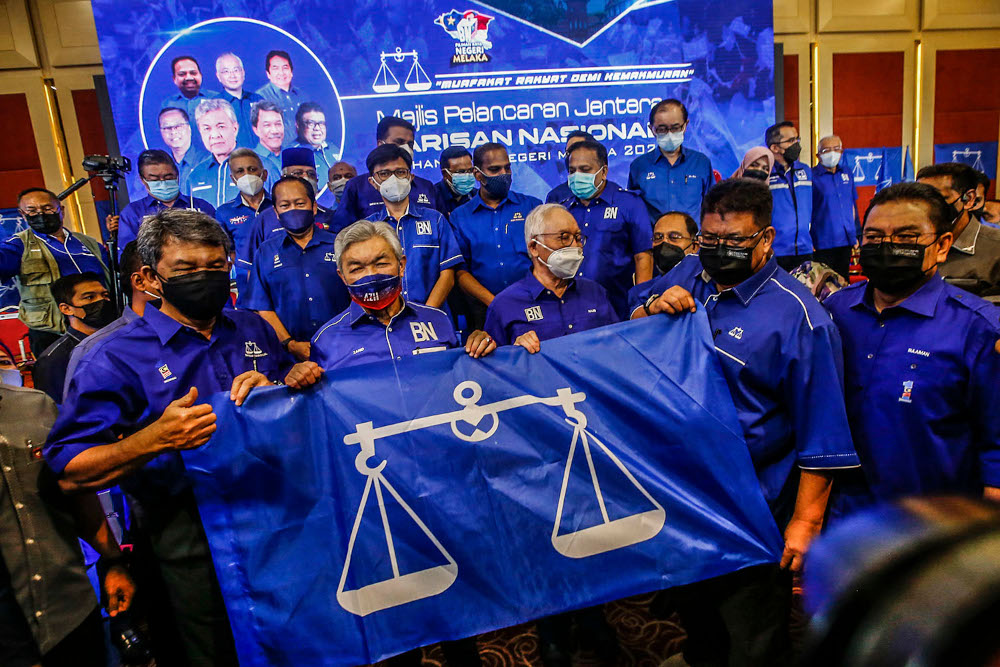KOTA KINABALU, Nov 7 — The expected campaigning for the Melaka state election could result in another surge of Covid-19 cases for the country but not one that would match those on record, said health experts.
The contest is also expected to be fierce as Barisan Nasional, Perikatan Nasional and Pakatan Harapan have each announced candidates for all 28 state seats, guaranteeing at least three-way fights in all constituencies.
Galen Centre for Health and Social Policy chief executive officer Azrul Mohd Khalib said that it was likely the standard operating procedures (SOP) would continue to be violated despite the prohibition on election-related gatherings.
“There will certainly be a surge in new Covid-19 positive cases, but not a wave. Most will likely be breakthrough cases, where the majority are those who have already been vaccinated. This will definitely happen.
“In an election campaign, physical rallies and gatherings will be held despite warnings, SOPs will be selectively observed or ignored altogether, politicians will want to be seen shaking hands, speaking without masks, and glad-handing supporters,” said Azrul when contacted by Malay Mail.
He said that Sabah was an example of how Malaysians could not organise large-scale elections safely during a pandemic.
Azrul said it was consequently fortunate that most of the country were fully vaccinated now, compared to the Sabah state election that took place last September and triggered the nation’s third wave of infections.
“History will repeat itself and it will be very hard to prevent mistakes from happening again such as what happened in the Sabah elections as Malaysians know no other way of political campaigning. It is still retail politics: Going house to house, coffee shop to coffee shop, hugging and shaking hands, organising crowded rallies, ceramah sessions and pondok panas.
“Experience tells us that no amount of policing or enforcement is going to work unless people are proactive and supportive of these measures,” he said.
AIMST University’s School of Medicine Assoc Professor Dr Saraswathi Bina Rai also agreed that a surge in Covid 19 cases was inevitable but doubted a fourth wave was imminent.
“I think there will definitely be an increase in cases especially as SOPs are not followed but not as exponential as after the Sabah elections. Vaccine coverage is high and that would lessen the effect,” she said.
She predicted that numbers will be in the hundreds, but said it could also be asymptomatic cases due to the vaccines.
Gleneagles Hospital Kota Kinabalu’s chief executive officer Dr Tan Bee Hwai also agreed that the breaches in SOPs so far indicate there could be an increase in cases and death rates if the violations persist.
“Avoiding crowded areas is an essential administrative Public Health method to decrease spread of human to human transmission of Covid-19 virus. In this phase, death rates are still around 50-80 people per day..I am confident that a break in SOP on crowding will increase the death rate due to Covid 19 in Melaka if SOP are weakly adhered,” he said.
“What we are concerned about are the rates of people needing hospitalisation due to severe disease, and dying as a result,” said Azrul.
But he also said a likelier scenario is that election turnout would be low, as voters were not convinced it was safe to be out in crowded spaces yet.
Dr Rai said that the country has come a long way in its management of the pandemic and the booster shots have proven effective in handling the worst effects of the virus.
“Elections cannot be postponed forever — but can be conducted with new rules and SOPs as is advocated throughout the country. No reason to throw all caution to the wind just because it’s elections. They are not exempt.
“This is a good time for the candidates to show how much they care for the people by being role models in how they go around campaigning and ensure that SOPs are followed,” she said.
The Melaka state election will take place on November 20. Health Minister Khairy Jamaluddin pre-emptively banned all gatherings related to the election as a precaution, citing the continued risk of Covid-19 infections in the country.



















